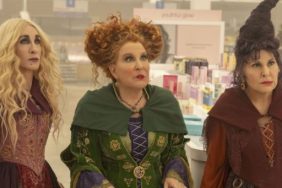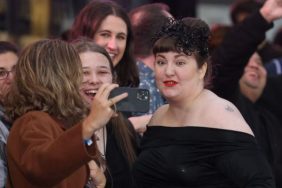
CraveOnline: Is there anything you had to access for Guardians of the Galaxy? Because, for instance, in Avatar you were a cat. But Gamora isn’t a cat. Is Gamora just Zoe Saldana with makeup on?
No, she was more of a wolf, Gamora. But she was a character that I didn’t really channel naturally, unconsciously. An animal isn’t what popped up. A bullfighter was. So yes, sometimes will hit me like that, or sometimes I will make a decision and then do the research and then it was the right choice, and if it isn’t then I switch. But I do believe that everybody has an animal, an essence that defines you, the way you think. You know how there are dog lovers and then there are cat lovers, and their personalities are very respective to the pet that they prefer to have? So I feel like every human being is like that, and there are more animals in the animal kingdom, so you could be many things. And sometimes it’s not even about studying how they move, you can study their habitat. Their way of life, their lifespan. You study that and you’re going to see how you can incorporate that into what you’re doing. You can only pray that it transpires.
I just had this horrible thought of an actor who’s a cat person, and then they have to play a dog person on camera, and then they’re stuck that way for months and their cats don’t like them anymore, and it’s very sad.
You’re like me. I can just keep going with things so much. [Laughs]
I can derail an interview like that! [Snaps fingers]
I love it. [Laughs]
What were you thinking of in terms of developing Out of the Furnace? Were you thinking about your character in terms of a spirit animal?
No, no. Lena to me was a woman, an everyday woman, and a human being who has been through a lot and is very fragile. When I read the script I wanted to pick on her. Out of all the characters I wanted to pick on her, because to me she felt like the weakest. And that was me, and the animal that I have, being aggressive, preying on someone that I consider weak. In reality she wasn’t weak. She’s on her own journey. She’s made poor decisions in her life, but the number one person that suffers from those is her, so I can’t judge her. I don’t know what her life had been that led to her to come to point that she feels like she can’t go and stick by his side, now that he needs her the most. She can’t be alone. She feels very vulnerable, very dependent. There’s a reason as to why you get to a point like that in your life, and as to why you make the decision that you make in your life.
As an outsider I can judge her, but I was hired to “be” her, so I can’t go into this with a judgmental heart. The reality is it would be very wrong of me to discard somebody so quickly, and I hope I never become that. I wanted to be a part of this story besides the cast, besides working with Scott Cooper, because I didn’t really understand her and I wanted to. I need to understand that. I need to be lenient and passionate and respectful as to why people are who they are.
Are there any other roles you’ve taken because you couldn’t puzzle out who the character was?
Yeah, the character that I played in Colombiana. I don’t know what it’s like to be cornered and abused to a point that you can’t get out of that situation.
Well, I’m glad to hear that.
[Laughs] Yeah. I don’t know. So she really scared me. She had so much hate in her heart, but it stemmed out of all this hurt, from all the loss that she had experienced in her life. Everything was ripped out of her, so she was just a walking shell, an empty shell of a person. I don’t know what it’s like to have witnessed so much violence. Her parents are killed in front of her, and that was a very scary character for me to dive into. It’s scary because to live in that head can become very unnerving.
Do you have to visualize that ugliness happening to real people you know, or can it be more academic than that?
I think it has to be a combination of both things. If you just have a rational knowledge, if you just read or speak to a psychiatrist or a psychologist [about] people who have experienced rape… No, no, no, no, it’s you trying to find a way to imagine that happening to you, by all the information and all the tools that you have used to get there. The biggest piece is to try to feel it, because we are creatures that operate on feeling more than we operate on thought, so I can’t just be methodical about a character. I think it would be completely stale.
Is there anything methodical about your acting, that you’ve got down or have a very specific process for?
Am I methodical…? I am very strict with the work, yes. I feel very scared, and I’ve been there before, where you haven’t done your homework and really cracked that puzzle, and you get there… Those are the only times I experience complete panic, when I don’t know what I’m doing. You can’t just wing it. I consider it to be very disrespectful on all levels, not just on the art that we do, the people that you work with, but primarily the audience that’s paying the fourteen dollars to go in and see you wing it? It’s just absolutely disrespectful. You’re a storyteller, and I really take that highly, with a lot of respect I mean. So I am methodical about my training process, then after a while, after you’ve created all these backstories and you have all this information, then you just have to let it sink in and start to feel it.
Do you ever have that nightmare where you’re on stage and you forgot all your lines?
All the time.
I will never shake that as long as I live.
Every other take. [Laughs]
William Bibbiani is the editor of CraveOnline’s Film Channel and co-host of The B-Movies Podcast. Follow him on Twitter at @WilliamBibbiani.






